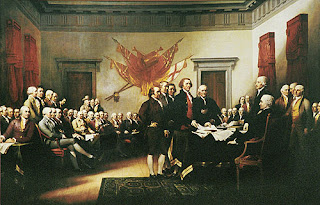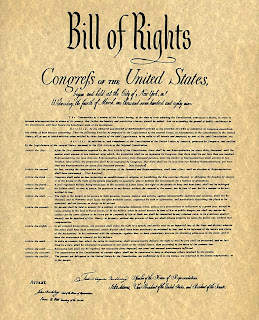The Europeans living in what we now call the U.S. rebelled against Britain taxing them without representation. This began as opposition to a stamp act of 1765, but grew from there. Gradually, the colonists began forming their own governing councils, taking control of their own communities, working together in what they called the Continental Congress, and resisting British rule. It was a shadow government to which the colonists committed their allegiance.
In 1773, Britain passed the Tea Act, imposing taxes on tea imported to the colonists. The colonists began a boycott of the tea, refusing to buy it on the grounds that Britain had no right to tax the colonists. "Taxation without representation" was considered illegitimate. Since the colonists were not represented in the British government, they did not want to pay taxes to England. Citizens prevented ships from unloading tea in the colonies, but in Boston the governor refused to allow the ships to leave. The colonists finally went aboard the ships and dumped the tea into the ocean. This later became known as the Boston Tea Party.
(British troops move on Concord, Massachusetts)
Britain moved in to stop this rebellion, sent troops to occupy and rule Massachusetts. Conflict and tensions continued and eventually ended in war. Britain declared the colonist's separate and shadow government, the Continental Congress and its members, to be traitors. The colonists who supported independence from England issued the Declaration of Independence.
A committee of five was appointed to prepare a Declaration of Independence of the 13 colonies from England. Thomas Jefferson was selected by the committee to prepare the first draft. Why? He was the best writer, eloquent and persuasive. John Adams came in second, but he voted for Jefferson because, as he said: “Reason first—You are a Virginian, and a Virginian ought to appear at the head of this business. Reason second—I am obnoxious, suspected and unpopular. You are very much otherwise. Reason third—You can write ten times better than I can.”
The Declaration was signed on July 4, 1776, and read publicly throughout the colonies on July 5. Supposedly the first reading was in Philadelphia, depicted here:
The war against England continued until 1783, and was finally settled by a peace treaty known as the Treaty of Paris.
Note: thousands of colonists fought on the side of Britain, on the side of the oppressor, much like the teapartiers and white working class Republicans of today.
After England was no longer in charge, the colonists had to decide whether each of the colonies would be an independent nation, or whether each of the colonies would be united in some manner. The initial agreement among the 13 colonies was that each would be generally responsible for affairs within their colony, they would help each other out when needed, and they would be united for purposes of dealing with the outside world.
This agreement was originally set forth in the Articles of Confederation, agreed to by Congress in 1777 and ratified in 1781. "Articles of Confederation and perpetual Union between the states of New Hampshire, Massachusetts-bay Rhode Island and Providence Plantations, Connecticut, New York, New Jersey, Pennsylvania, Delaware, Maryland, Virginia, North Carolina, South Carolina and Georgia. ... Article III: The said States hereby severally enter into a firm league of friendship with each other, for their common defense, the security of their liberties, and their mutual and general welfare, binding themselves to assist each other, against all force offered to, or attacks made upon them, or any of them, on account of religion, sovereignty, trade, or any other pretense whatever."
In 1787, the members of congress agreed they needed to amend the Articles but then decided to just draft an entirely document, which became the U.S. Constitution. It begins with the famous phrase: "We the people of the United States, in Order to form a more perfect Union, establish Justice, insure domestic Tranquility, provide for the common defence, promote the general Welfare, and secure the Blessings of Liberty to ourselves and our Posterity, do ordain and establish this Constitution for the United States of America.
Many of the citizens had no interest in becoming part of a union with a strong central (federal) government because they figured it would be abusive, just like England had been. In order to convince them to accept the Constitution, the first ten amendments to the Constitution were prepared, often called the Bill of Rights.
The Bill of Rights was intended to clarify that all the rights of the individual remain with the individual, and cannot be taken away by the government. Some people think that the Bill of Rights gives rights to the citizens. That is untrue. The Bill of Rights instead confirms that the citizens have many rights associated with freedom, and simply confirms that the federal government has no authority to take away or impair those rights. Citizens have the freedom of speech, for example, not because the government gave it to us, but because we are born with it. The Bill of Rights simply states that the government cannot pass laws trying to impair our freedom of speech. The same is true for the first 10 amendments to the constitution which are commonly called the Bill of Rights.








No comments:
Post a Comment